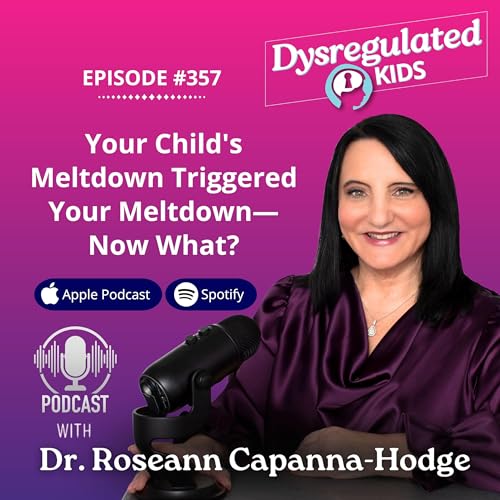
357: Your Child's Meltdown Triggered Your Meltdown—Now What?
No se pudo agregar al carrito
Add to Cart failed.
Error al Agregar a Lista de Deseos.
Error al eliminar de la lista de deseos.
Error al añadir a tu biblioteca
Error al seguir el podcast
Error al dejar de seguir el podcast
-
Narrado por:
-
De:
Parenting a child who’s melting down while you’re barely holding it together yourself can feel impossible.
One minute you’re calm, and the next—you’re yelling too. You didn’t mean to, but their meltdown triggered yours. You’re not alone, and it doesn’t mean you’re a bad parent. It means both of your nervous systems are overwhelmed.
Let me share why this happens and exactly how to stop the cycle of dysregulation before it spirals out of control. You’ll learn how your calm can anchor your child, what to do in the heat of the moment, and how small shifts can lead to lasting change in your family.
Why Do I Lose My Cool When My Child Has a Meltdown?
When your child screams, your nervous system feels it. That’s because of mirror neurons—the part of the brain that syncs emotions and energy between people. Your child’s chaos can trigger yours, just like your stress can trigger theirs.
Here’s what’s happening:
- Your stress cup overflows just like your child’s. Every demand, noise, or unexpected change adds a drop until you spill over.
- Your survival brain takes over. Logic goes offline, patience disappears, and you react instead of respond.
- You move into fight, flight, or freeze, which makes emotional regulation nearly impossible.
🗣️ “When meltdowns meet meltdowns, everyone’s brain goes offline. That’s why we calm the brain first—because no one can think when they’re in survival mode.” –Dr. Roseann
What Should I Do When My Child’s Behavior Triggers Me?
When that meltdown starts brewing, it’s not about perfection—it’s about presence.
Try these calming techniques in the moment:
- Pause and breathe. Slow, deep breathing resets your nervous system and helps you stay grounded.
- Notice your body. Are your shoulders tight? Is your breathing shallow? These are early signs you’re dysregulated.
- Step away if needed. It’s OK to say, “I love you, but I need a minute to calm my body.”
- Anchor with calm body language. Kneel down, soften your voice, and lower your tone. Your calm presence helps your child’s brain feel safe again.
Remember: Behavior is communication. Your child isn’t trying to make you lose it—they’re showing you that their nervous system needs help to regulate emotions.
Yelling less and staying calm isn’t about being perfect—it’s about having the right tools.
Join the Dysregulation Insider VIP list and get your FREE Regulation Rescue Kit, designed to help you handle oppositional behaviors without losing it.
Download it now at www.drroseann.com/newsletter
How Can I Break the Cycle of Reactivity in My Family?
I once worked with a dad named Michael who constantly clashed with his son, Jordan. Every argument ended in shouting matches—until Michael realized something powerful: he was getting pulled into the same dysregulated state as his child.
When he learned to pause, breathe, and step back before reacting, everything changed. His calm energy helped Jordan settle faster—and the daily battles stopped.
Key takeaways for parents:
- You set the...


